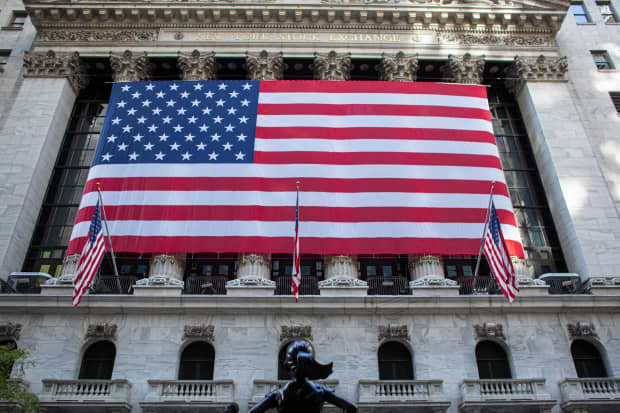This post was originally published on this site

Kena Betancur/Agence France-Presse/Getty Images
U.S. stock-index futures pointed lower Friday, with equities threatening to end a torrid election week rally as investors awaited October jobs data, continued to monitor election results and weighed a surge in COVID-19 cases.
What are major benchmarks doing?
Futures on the Dow Jones Industrial Average YM00, -0.70% were down 212 points, or 0.8%, to 28,085, while S&P 500 futures ES00, -0.85% fell 35.05 points, or 1%, to 3,469.75. Nasdaq-100 futures NQ00, -1.05% dropped 150.75 points, or 1.3%, to 11,925.75.
The Dow DJIA, +1.94% on Thursday rose 542.52 points, or 2%, to finish at 28,390.18, while the S&P 500 SPX, +1.94% advanced 67.01 points, or 2%, to close at 3,510.45. The Nasdaq Composite COMP, +2.59% surged 300.15 points, or 2.6%, to end at 11,890.93. Through Thursday, the S&P 500 and Dow were each up more than 7% for the week, while the Nasdaq was up nearly 9%.
What’s driving the market?
Stocks were in danger of ending a four-day winning streak that saw equities extend gains in the wake of Tuesday’s elections, with the ongoing vote tally showing Democratic challenger Joe Biden closing in on the 270 electoral college votes needed to defeat President Donald Trump.
Read: Biden pulls ahead of Trump in Georgia
The rally was attributed in part to expectations for a Biden win coupled with diminishing chances of a Democratic takeover of the Senate, which would make it difficult to repeal the 2017 corporate income tax cut or raise other taxes.
“At least the market has a narrative: A Democrat President who doesn’t control the Senate, will be less combative on trade, but will be more limited where fiscal policy is concerned,” said Kit Juckes, macro strategist at Société Générale, in a note.
“This leaves a bigger role for the Federal Reserve, which means even lower rates for longer, even more QE for longer,” he wrote. “So the dollar is weaker, spreads are tight, equities have rallied around the world this week and volatility is (even) lower than it was.”
Control of the Senate, however, might not be clear until January, with a pair of races in Georgia potentially headed to runoffs.
While the drama around the election has been in focus all week, U.S. economic data on Friday is expected to show a slowdown in jobs growth. Economists surveyed by MarketWatch expect the economy to have added 530,000 jobs in October, which would be the slowest since the labor market began to recover from the COVID-19 pandemic in May.
Meanwhile, the continued rise in COVID-19 infections threatens to squelch the economic rebound. The U.S. on Thursday saw new cases top 100,000 for a second day in a row, marking consecutive records.
Which companies are in focus?
- Shares of Uber Technologies Inc. UBER, +2.36% fell in premarket trade after the ride-hailing company, fresh off its election victory to avoid classifying drivers as workers in California, reported results that showed its business continues to recover from the pandemic.
- Peloton Interactive Inc. PTON, +6.77% shares were down 4.9% after the interactive exercise-equipment company said sales continued to surge as a result of the pandemic but warned that it continues to struggle with supply issues that make it difficult to keep up with demand.
- Shares of CVS Health Corp. CVS, +1.72% were up 3% in premarket trade after the drugstore chain beat estimates for the third quarter and raised its full-year guidance, buoyed by strong demand for coronavirus testing.
- Shares of Hershey Co. HSY, +0.45% were up in premarket trade after the chocolate and confectionery products company delivered third-quarter profit and revenue that beat expectations, and provided an upbeat full-year outlook.
- ViacomCBS Inc. VIAC, +5.10% shares were higher after delivering results topped Wall Street expectations.
- Shares of Marriott International Inc. MAR, +2.92% were higher after the hotel operator reported a surprise third-quarter profit and revenue that fell a little less than forecast, while not providing financial guidance given “numerous uncertainties” associated with the COVID-19 pandemic.

